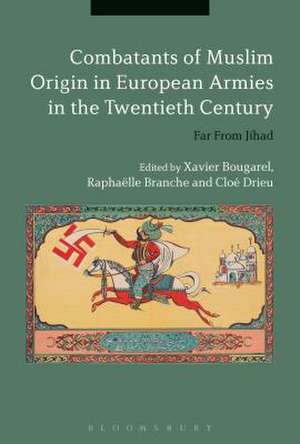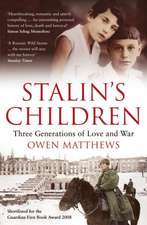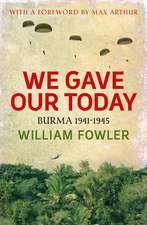Combatants of Muslim Origin in European Armies in the Twentieth Century: Far From Jihad
Editat de Xavier Bougarel, Raphaëlle Branche, Cloé Drieuen Limba Engleză Paperback – 19 sep 2018
| Toate formatele și edițiile | Preț | Express |
|---|---|---|
| Paperback (1) | 237.66 lei 6-8 săpt. | |
| Bloomsbury Publishing – 19 sep 2018 | 237.66 lei 6-8 săpt. | |
| Hardback (1) | 568.80 lei 6-8 săpt. | |
| Bloomsbury Publishing – 8 mar 2017 | 568.80 lei 6-8 săpt. |
Preț: 237.66 lei
Preț vechi: 272.74 lei
-13% Nou
Puncte Express: 356
Preț estimativ în valută:
45.48€ • 48.63$ • 37.92£
45.48€ • 48.63$ • 37.92£
Carte tipărită la comandă
Livrare economică 17 aprilie-01 mai
Preluare comenzi: 021 569.72.76
Specificații
ISBN-13: 9781350085893
ISBN-10: 1350085898
Pagini: 256
Dimensiuni: 156 x 234 x 24 mm
Greutate: 0.36 kg
Ediția:NIPPOD
Editura: Bloomsbury Publishing
Colecția Bloomsbury Academic
Locul publicării:London, United Kingdom
ISBN-10: 1350085898
Pagini: 256
Dimensiuni: 156 x 234 x 24 mm
Greutate: 0.36 kg
Ediția:NIPPOD
Editura: Bloomsbury Publishing
Colecția Bloomsbury Academic
Locul publicării:London, United Kingdom
Caracteristici
Adopts a comparative approach, including contributions examining combatants of different origins and their involvement in a variety of different European armies
Notă biografică
Xavier Bougarel is a Research Fellow at the Centre d'Études Turques, Ottomanes, Balkaniques et Centrasiatiques, France.Raphaëlle Branche is Professor of Modern and Contemporary History at the University of Rouen, France.Cloé Drieu is a Researcher at the French National Centre for Scientific Research, France.
Cuprins
List of IllustrationsNotes on ContributorsAcknowledgmentsList of AbbreviationsIntroduction Xavier Bougarel (Centre d'Études Turques, Ottomanes, Balkaniques et Centrasiatiques, France), Raphaelle Branche (University of Rouen, France) and Cloé Drieu (French National Centre for Scientific Research, France).1. Algerians in the French Army, 1914-1918: From Military Integration to the Dawn of Algerian Patriotism Gilbert Meynier (Nancy II University, France)2. Feeding Muslim Troops during the First World War Emmanuelle Cronier (University of Picardie, France)3. Muslim Askaris in the Colonial Troops of German East Africa, 1889-1918 Tanja Bührer (University of Rostock, Germany)4. Turkic Muslims in the Russian Army: From the Beginning of the First World War to the Revolution of 1917 Salavat M. Iskhakov (Institute of Russian History, Russia)5. Between 'Non-Russian Nationalities' and Muslim Identity: Perceptions and Self-Perceptions of Soviet Central Asian Soldiers in the Red Army, 1941-1945 Kiril Feferman (USC Shoah Foundation Center for Advanced Genocide Research, USA)6. Islam, a 'Convenient Religion'? The Case of the 13th SS Division Handschar Xavier Bougarel (Centre d'Études Turques, Ottomanes, Balkaniques et Centrasiatiques, France)7. The Officer for Muslim Military Affairs in the First French Army, 1944-1945: An Agent of Control or an Intermediary? Claire Miot (Département de Sciences Sociales, École Normale Supérieure, France)8. Haunted by Jinns. Dealing with War Neuroses among Muslim Soldiers during the Second World War Julie Le Gac (University of Paris IV Sorbonne, France)9. 'Allah Might Provide the Fuel': Muslim Sailors in British Colonial Navies, from the Second World War to Independence Daniel Owen Spence (University of the Free State, South Africa)GlossaryIndex
Recenzii
Combatants of Muslim Origin in European Armies in the Twentieth Century is a welcome contribution to the study of the entangled military histories of Muslim and European societies. Its broad purview will benefit students and scholars interested in its subject matter . [Its] well-researched and enlightening essays are valuable both in themselves and as guideposts for future investigations.
This volume is a significant contribution of scholarship that treats the topic with impressive breadth and depth and strikingly demonstrates the complex social and cultural interconnections between religion, imperial orders and warfare.
Recent new approaches to colonial and military history have shone a searchlight on the forgotten contributions made by around seven million Muslims to Europe's colonial armies during two World Wars. Offering the first survey of Muslim-origin soldiers in the French, Russian, German and British colonial armies, this volume's nine case studies offer unequalled breadth. Collectively, the essays address not only the tangible activities of loyal Muslims, but also the more subtle formulation of a loyalist Islam. This interplay of policy and piety is traced through official attitudes from above, private conscience from below, and myriad accommodations in between.
Combatants of Muslim Origin in European Armies in the Twentieth Century is critical reading for anyone interested in the intertwined histories of Europe and the Muslim world during the last century, and indeed during this century. The volume reminds us that today's interactions between Muslims and Europeans have a rich history, and that stereotypes about that history often perpetuate misunderstandings in the present. Here in this study, an international team of the very best scholars in the field addresses the key issue of the role of Islam in the service of Muslims in Europeans armies during the two world wars. Readers come away with a keen understanding of a wide variety of experiences, and a far better understanding of how religion, politics, culture, and war come together in volatile ways.
This fascinating book shows how a range of European powers at war sought to win Muslim peoples over to their side. The wide-ranging contributions of the individual authors highlight the variety of paths of accommodation between European empires and their Muslim military subjects, showing how the everyday wartime practices of Muslim soldiers were indeed 'far from jihad'. This richly-researched volume is a significant contribution to scholarship.
This volume is a significant contribution of scholarship that treats the topic with impressive breadth and depth and strikingly demonstrates the complex social and cultural interconnections between religion, imperial orders and warfare.
Recent new approaches to colonial and military history have shone a searchlight on the forgotten contributions made by around seven million Muslims to Europe's colonial armies during two World Wars. Offering the first survey of Muslim-origin soldiers in the French, Russian, German and British colonial armies, this volume's nine case studies offer unequalled breadth. Collectively, the essays address not only the tangible activities of loyal Muslims, but also the more subtle formulation of a loyalist Islam. This interplay of policy and piety is traced through official attitudes from above, private conscience from below, and myriad accommodations in between.
Combatants of Muslim Origin in European Armies in the Twentieth Century is critical reading for anyone interested in the intertwined histories of Europe and the Muslim world during the last century, and indeed during this century. The volume reminds us that today's interactions between Muslims and Europeans have a rich history, and that stereotypes about that history often perpetuate misunderstandings in the present. Here in this study, an international team of the very best scholars in the field addresses the key issue of the role of Islam in the service of Muslims in Europeans armies during the two world wars. Readers come away with a keen understanding of a wide variety of experiences, and a far better understanding of how religion, politics, culture, and war come together in volatile ways.
This fascinating book shows how a range of European powers at war sought to win Muslim peoples over to their side. The wide-ranging contributions of the individual authors highlight the variety of paths of accommodation between European empires and their Muslim military subjects, showing how the everyday wartime practices of Muslim soldiers were indeed 'far from jihad'. This richly-researched volume is a significant contribution to scholarship.











